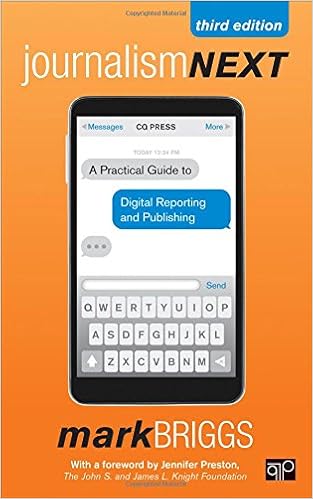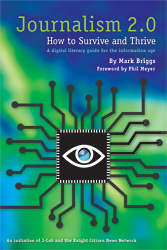
What’s it like to run training sessions at a newspaper that has been through layoffs and buyouts and is currently on the block?
I found out this week at the Union-Tribune in San Diego leading three sessions for an APME NewsTrain workshop. Great people, intriguing ideas and interesting conversations. But the economic crisis infecting the news industry was an inescapable subtext.
One moment stood out: a full elevator can’t help but listen as one Union-Tribune employee greets another and then says “I’m leaving – taking the buyout.” The reply comes: “I’m so sad because I thought we were becoming friends” as she departs one floor below the rest of the workshop attendees.
Alright – who’s ready to talk about ethics in the digital age?
After a collective deep breath, we carried on. Because what else can we do?
Ryan Pitts led off the workshop with a 55 mph drive-by of interesting web technologies and concepts. I call it the shiny new object list. Ryan was nice enough to share that list and you can find it here.
My sessions were more about discussion and less about demonstration (presentation slides here). Here are some links with the points I tried to make with each:
IndyMoms.com: Build a community and provide an information exchange. It may not be journalism per se, but it’s good business and it’s good for the brand.
Vita.mn: Crowd-source your arts and entertainment coverage like the Star-Tribune does.
NowPublic: Building a community of 130,000 correspondents takes a lot of hand-slapping, back-patting and TLC.
Publish2: Link journalism has worked for Drudge for 10 years. Now news sites have an easy way to do it with quality.
Help Our Habitat: One environmental reporter’s brainchild, we turned over the keys to this passionate community and let them drive.
The Batavian: Howard Owens and Gatehouse proving that all media markets are liquid by launching this open source startup news site in a town they don’t print in.
Newsgarden: My new company’s first product, it’s a platform for pro-am journalism as it blends published news stories, blog posts and other short bites and locates them on a map so that users can see what’s happening in their neighborhood.
Ethics is sexy again
Not sure if ethics was sexy before, but the topic of ethics and values in the digital age generated a surprising level of discussion, especially since it came during the last session of the day. (Usually this is the time slot where everyone breaks out their laptop and catches up on email before heading for post-workshop drinks). I pointed out how timely the session was considering the work being done by Steve Fox, Ellyn Angelotti and others at the ONA conference and Whose Rules? summit in the past two weeks. You can find more about each at the new Online Ethics Wiki.
Dealing with user generated content – especially comments – dominated the discussion. Did you know editing comments is now widely considered just as legally protected as we all used to consider NOT editing to be? Many folks at the workshop did not. (See background here.)
We also discussed privacy issues when publishing databases, speed vs. confirmation issues when publishing breaking news, accuracy and verification issues related to user generated content and even how mobile reporting (using Twitter on the scene, for example) can introduce other unforeseen pitfalls.
Thankfully, everyone in attendance is over the idea that you shouldn’t link to a competitor.
I concluded the session by reminding everyone that all this is new and ever-evolving. And to keep faith in the centuries-old concept of the marketplace for ideas.
How about a site for NIMBYs?
Challenged with an assignment to conceive a new, digitally-infused community coverage model (and 15 minutes to do it) one group proposed building a hyperlocal, geotargeted social news site focusing on new development and, especially, those who oppose it.
Another group thought the local economy and employment could drive audience and community with news about who’s hiring and who’s cutting, which businesses are opening and closing.
Other groups chose more traditional topics like prep sports, local arts, entertainment, and local education.
How will all this help the business model?
The inevitable question at these sessions – “what’s the business model?” – seems to always arise. You can’t blame people for wondering when their jobs are on the line and friends and colleagues are now looking for work.
A collective sense that newsrooms are innovating faster than advertising and marketing departments seems present wherever I go these days. While that may be true, the last thing you editors, navigators, journobloggers and multimedia divas can afford to consider is slowing down. Or waiting for them to catch up.
As Abe Lincoln said: Whatever you are, be a good one.
 Mark Briggs
Mark Briggs  Posted in
Posted in  Tags:
Tags: 





Shanell Mcumber
I found a great…
Terrance Fellars
I found a great…
Good blog you have got here.. It’s difficult to find good quality writing like yours nowadays. I seriously appreciate people like you! Take care!!